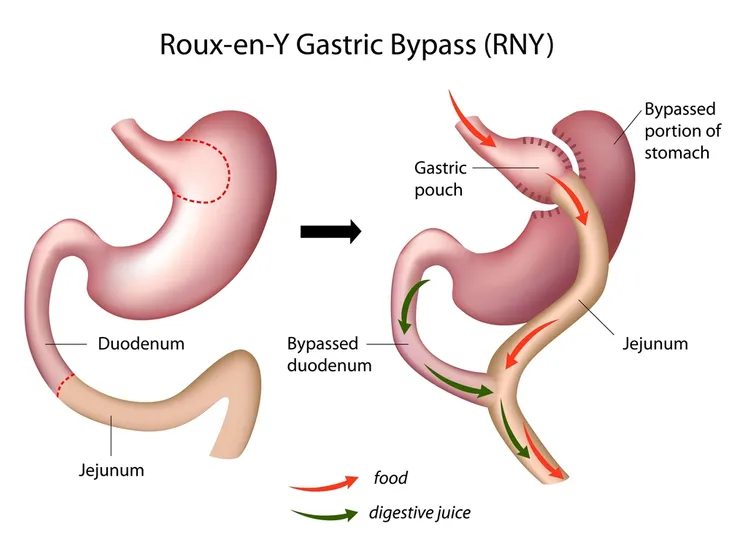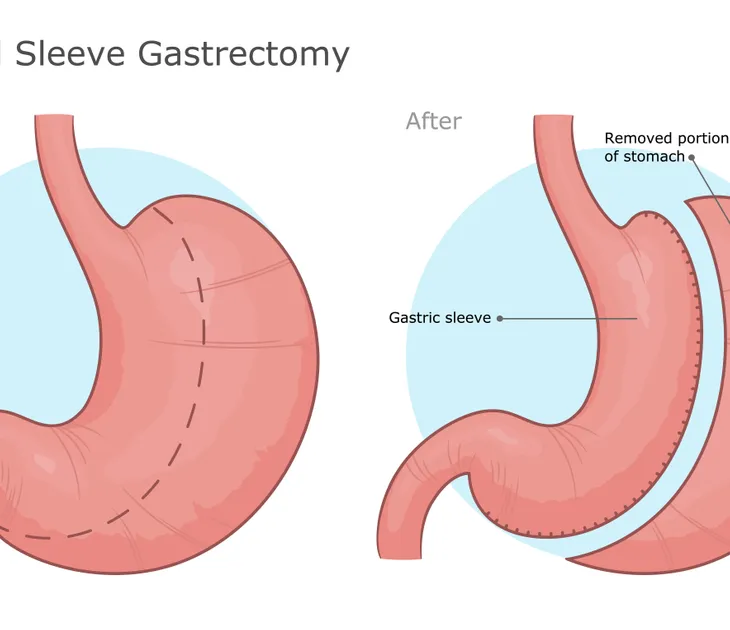Losing weight is not always easy and some people struggle more than others. If you’re still struggling to lose weight even after improving your diet, exercising, and making other lifestyle adjustments, then your doctor may recommend bariatric surgery. This surgery is a viable option, especially when you need to lose a significant amount of weight, however, there are a couple of approaches worth considering.
The most frequently performed bariatric surgeries are gastric sleeve surgery and gastric bypass surgery, which share certain similarities but also have crucial differences. If you want to learn more about these surgeries and determine which one may be better suited to your needs, keep reading for a detailed comparison of their procedures.
What Is Gastric Sleeve Surgery?
Gastric sleeve surgery, also known as sleeve gastrectomy, is a bariatric surgical procedure that involves reducing the size of the stomach. During the procedure, the surgeon removes approximately 80-percent of the stomach, leaving behind a small banana-shaped pouch.
This smaller stomach restricts the amount of food a person can eat, which leads to reduced caloric intake and then weight loss. Gastric sleeve surgery is typically performed laparoscopically, which involves making a small incision in the abdomen and using a small camera to guide the surgical instruments. Laparoscopic surgery is often preferred as it usually requires less recovery time and produces smaller scars compared to traditional open surgery.
What Is Gastric Bypass Surgery?
Gastric bypass surgery, also known as Roux-en-Y gastric bypass, is a type of bariatric surgery that helps people lose weight by altering their digestive system. During the procedure, the surgeon creates a small pouch at the top of the stomach, which is then connected directly to the small intestine. This bypasses a portion of the stomach and the first part of the small intestine, reducing the amount of food a person can eat and limiting the absorption of calories and nutrients.
Though gastric bypass surgery can be performed using traditional open surgery and laparoscopic techniques, laparoscopic is typically preferred as it results in a faster recovery time and smaller scars.
 Alila Medical Media / Shutterstock
Alila Medical Media / ShutterstockGastric Sleeve vs. Gastric Bypass Surgery: The Similarities
Gastric Sleeve and Gastric Bypass surgeries are both weight loss procedures that aim to help individuals with obesity lose weight and improve their health. Both procedures can improve or resolve obesity-related health issues such as type 2 diabetes, high blood pressure, and sleep apnea. They both result in significant weight loss and can lead to long-term weight management success, provided patients maintain a healthy diet and exercise regularly.
The procedures are also similar in that they’re performed under general anesthesia, and typically require a hospital stay. After both surgeries, patients need to adhere to a restricted diet that includes small, frequent meals to help their stomachs heal and adjust to the reduced size. Both surgeries also involve a recovery period, during which patients need to take time off from work or other activities to recuperate.
Gastric Sleeve vs. Gastric Bypass: The Major Differences
Despite their similarities, gastric sleeve and gastric bypass surgeries are two different procedures. They have a few notable differences in terms of their mechanisms of action, surgical techniques, and expected outcomes, including the following:
- Size of the stomach: In gastric sleeve surgery, a significant portion of the stomach is removed to create a small, banana-shaped stomach. Gastric bypass surgery, on the other hand, creates a small stomach pouch and reroutes a portion of the small intestine to bypass the remaining stomach.
- Effectiveness: Gastric bypass surgery is more effective in terms of weight loss compared to gastric sleeve surgery. Studies have found that gastric bypass surgery results in greater weight loss in the first 2-years after surgery, although both surgeries can lead to significant weight loss over time.
- Nutrient absorption: Because gastric bypass surgery reroutes a portion of the small intestine, it can lead to malabsorption of certain nutrients, including vitamins and minerals. This means that patients may need to take supplements for the rest of their lives. Gastric sleeve surgery does not typically result in malabsorption.
- Risks and complications: Both surgeries carry risks and potential complications, but the risks associated with gastric bypass surgery tend to be higher due to the rerouting of the small intestine. For example, gastric bypass surgery can lead to bowel obstruction or leakages.
- Reversibility: Gastric sleeve surgery is not reversible, as the portion of the stomach that is removed cannot be put back. Gastric bypass surgery can technically be reversed, but it is a more complex and risky procedure.
Are Dietary Changes Required After Bariatric Surgery?
The dietary changes required after gastric sleeve surgery and gastric bypass surgery are generally similar. According to the National Health Service (NHS), in the first few days after surgery, you will only consume liquids, followed by pureed and then soft food for the next 4- to 6-weeks. Week six and onwards, you can gradually return to a healthy, balanced diet.
The primary difference in the postoperative period is the size of the stomach pouch, which determines the amount of food you can consume. The pouch created by gastric bypass surgery holds approximately 1-ounce of food, which is slightly smaller than a golf ball. In comparison, gastric sleeve surgery creates a pouch that can hold 2 to 5-ounces of food. It’s important to avoid overeating after bariatric surgery because the pouch can stretch over time, leading to weight gain. It’s important to follow your doctor’s dietary guidelines after either surgery, which typically include:
- Eating small portions
- Eating slowly and chewing thoroughly
- Taking recommended vitamins and supplements
- Staying hydrated and sipping on fluids slowly
- Avoiding difficult-to-digest food and carbonated beverages
How to Choose the Right Weight Loss Surgery
Ultimately, the choice between gastric bypass and gastric sleeve surgery depends on various factors, including your weight loss goals, health status, and personal preferences. Choosing the right weight loss surgery is a big decision that should be made after careful consideration and consultation with a healthcare professional. Here are some factors to consider when choosing the right weight loss surgery:
- Health conditions: Some weight loss surgeries, such as gastric bypass, may be more suitable for individuals with certain health conditions, such as type 2 diabetes, high blood pressure, and sleep apnea. Other procedures, such as gastric sleeve, may be appropriate for people with less severe health issues.
- Body Mass Index (BMI): BMI is a measure of body fat based on height and weight. The higher the BMI, the greater the risk of obesity-related health problems. Individuals with a BMI of 40 or higher may be candidates for bariatric surgery, including gastric bypass, while those with a BMI of 35 or higher may be eligible for gastric sleeve surgery.
- Lifestyle and eating habits: Bariatric surgery requires significant lifestyle changes, including a restricted diet, exercise, and vitamin and mineral supplements. It is essential to assess your current eating habits, preferences, and willingness to make long-term lifestyle changes before undergoing surgery.
- Surgical risks and potential complications: Like all surgeries, bariatric surgery has risks and potential complications that should be thoroughly discussed with a healthcare professional before making a decision.
- Personal preferences: Ultimately, the choice of weight loss surgery is a personal decision that should take into account personal preferences, goals, and expectations.
It is crucial to have a thorough consultation with a qualified healthcare professional who can help you evaluate your options and choose the best weight loss surgery for your individual needs and goals.








